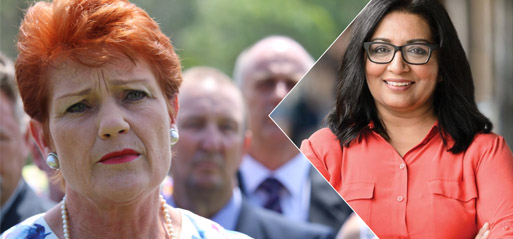
Elham Asaad Buaras
In a landmark decision on November 1, Australia’s Federal Court ruled that One Nation leader Pauline Hanson racially vilified Greens Senator Mehreen Faruqi during a highly publicised social media exchange.
The dispute originated in September 2022 when Faruqi, who migrated from Pakistan in 1992, criticised the monarchy following Queen Elizabeth II’s death, calling her “the leader of a racist empire built on stolen lives, land, and wealth of colonised people.” Hanson responded with a tweet urging Faruqi to “pack [her] bags and p##s off back to Pakistan,” which ignited controversy and ultimately led to the court ruling.
Justice Angus Stewart characterised Hanson’s post as an “angry personal attack” laden with a “strong form of racism.” He noted that it conveyed several damaging messages: that Faruqi, as an immigrant, was unjustly critical of Australia; that she should “be grateful and keep quiet”; and that her rightful place was in her country of origin. Stewart condemned Hanson’s language as reflective of the troubling “go back to where you came from” sentiment prevalent in Australia.
This afternoon @larissawaters and I have lodged a Senate motion censuring Senator Hanson for her anti-migrant attack telling me to “piss off back to Pakistan”.
I call on all my colleagues to support the motion and affirm that racism has no place in our public debate. pic.twitter.com/GwIGDD5kU2
— Mehreen Faruqi (@MehreenFaruqi) September 26, 2022
Hanson’s defence argued that her remarks fell within the realm of legitimate political debate, but Justice Stewart found that the tweet was “profoundly and seriously” likely to offend, insult, or intimidate Faruqi and others based on race or ethnicity.
“This is a good day for people of colour, Muslims, and everyone working towards an anti-racist society,” Faruqi stated after the ruling. “Today’s judgment is a win for all those who have been told to go back to where they came from.”
As a result, Hanson has been ordered to delete the tweet within seven days and to cover Faruqi’s legal costs. Additionally, Faruqi has requested a $150,000 (approximately £78,000) charitable donation from Hanson in response to the case.
This ruling not only addresses Hanson’s inflammatory rhetoric but also underscores her longstanding anti-Muslim stance. Since entering office, she has consistently targeted Muslim Australians, framing them as threats to national security and incompatible with Australian values.
In 2015, she controversially claimed that Halal certification funded terrorism. Following the 2016 Orlando nightclub shooting, she called for a ban on Muslim immigration, proposed suspending mosque construction pending a royal commission to assess Islam, and advocated for CCTV in existing mosques. In her maiden Senate speech, she warned of being “swamped by Muslims” and suggested they “go back to where [they] came from,” leading to a walkout by the Australian Greens. After the January 2017 Melbourne car attack, Hanson reiterated her call for a Muslim ban, falsely asserting that all terrorist attacks in Australia were committed by Muslims. This prompted the Islamic Council of Victoria to demand an apology. Later, in response to the Westminster attack, she posted a “#Pray4MuslimBan” message on social media, arguing that a Muslim ban was essential for national security.
Hanson’s anti-Muslim stance extended to legislative efforts, including a successful motion in the Senate addressing Halal certification. One of her most notorious actions occurred in August 2017, when she wore a burqa in the Senate to advocate for a ban on the garment under the guise of “national security.” This stunt drew widespread condemnation, with Attorney-General George Brandis calling it offensive, earning her a standing ovation from both Labor and Greens senators.
Photo: Australia’s Federal Court ruled that One Nation leader Pauline Hanson (L) racially vilified Greens Senator Mehreen Faruqi during a public social media exchange. (Credit: Wikimedia Commons)